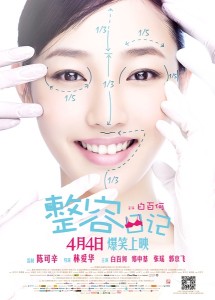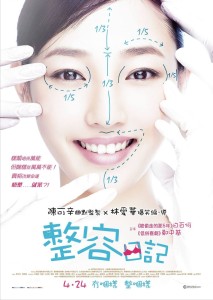The Truth about Beauty
整容日记
Hong Kong/China, 2014, colour, 2.35:1, 83 mins.
Director: Lin Aihua 林爱华 [Aubrey Lam].
Rating: 7/10.
Scabrous satire on success and cosmetic surgery is a major showcase for Mainland actress Bai Baihe.
Beijing, the present day. After four years at university, Guo Jing (Bai Baihe) has graduated with an honours degree in Chinese Literature and is looking for a job. Influenced by the maxim that “men dress for success, women go under the knife”, she decides to have double-eyelid surgery and spends all her scholarship money on the operation. Afterwards she spots her ex-boyfriend (Guo Jingfei) – who dumped her because her face looked like “a major car accident” – with another woman. Guo Jing goes for an interview at South Korea’s Daesung Group and is put on probation. Still obsessed that looks mean everything, she considers further cosmetic surgery to her face but doesn’t have enough money for the operation  under a Korean surgeon, Dr. Gim. After graduating to business manager, and working hard over Chinese New Year selling real estate, she goes ahead with the cosmetic surgery. Her best friend Weiwei (Zhang Yao) is so impressed that she also decides to go under the knife. After meeting the company’s senior executive, Lei Meng (Zheng Zhongji), several times, but never being sure whether he fancies her or not, Guo Jing finally has dinner with him, during which he says he dislikes women who have had cosmetic surgery. Lei Meng then asks her to go with him on a business trip to Inner Mongolia, during which they end up stranded in the middle of nowhere. Just when the two are about to sleep together, Guo Jing has a fall and dislodges her “new” chin. As Dr. Gim is in Switzerland, the restorative surgery is done by a Chinese doctor, who also sells Guo Jing on the idea of an expensive new breast implant, NoBra. But then, after the operation, NoBra posts pictures of her on the internet.
under a Korean surgeon, Dr. Gim. After graduating to business manager, and working hard over Chinese New Year selling real estate, she goes ahead with the cosmetic surgery. Her best friend Weiwei (Zhang Yao) is so impressed that she also decides to go under the knife. After meeting the company’s senior executive, Lei Meng (Zheng Zhongji), several times, but never being sure whether he fancies her or not, Guo Jing finally has dinner with him, during which he says he dislikes women who have had cosmetic surgery. Lei Meng then asks her to go with him on a business trip to Inner Mongolia, during which they end up stranded in the middle of nowhere. Just when the two are about to sleep together, Guo Jing has a fall and dislodges her “new” chin. As Dr. Gim is in Switzerland, the restorative surgery is done by a Chinese doctor, who also sells Guo Jing on the idea of an expensive new breast implant, NoBra. But then, after the operation, NoBra posts pictures of her on the internet.
REVIEW
A scabrous satire on the New China success ethic – and how far some people will go to pander to it – The Truth about Beauty 整容日记 manages the difficult trick of pushing its subject-matter (female cosmetic surgery) way beyond its comfort zone while still retaining rom-com elements with plenty of charm. The success of the film’s balancing act is almost entirely due to its main star, Mainland actress Bai Baihe 白百何, whose tour de force as a young businesswoman who just can’t stop going under the knife hits just the right note of knowing ditziness. A late starter on the big screen, Bai, 30, is still at a stage where she’s only as good as the material she’s served; in Beauty she can luckily get her teeth into a meaty script by Hong Kong writer-director Lin Aihua 林爱华 [Aubrey Lam] that holds to its blackly comic tone and doesn’t cop out in the final stages.
It’s only the fourth feature in 14 years by Lin – who’s better known as a longtime writer for director-producer Chen Kexin 陈可辛 [Peter Chan] – and her first since the arty misfire of psychodrama Anna & Anna 安娜与安娜 (2007). In some respects Beauty is a continuation of the doppelganger idea behind Anna, in which a businesswoman (played by Lin Jiaxin 林嘉欣 [Karena Lam]) returned to Shanghai and met her dowdier clone. In Beauty the main character doesn’t experience any sci-fi shennanigans but she essentially ends up as a beautiful clone of her earlier geeky self. And the two films’ basic tenet is the same: how big a role do good looks play in success and romance?
The answer in Beauty is: a lot, but it’s not fair that women should be the only ones judged by good looks. Lin doesn’t belabour the point or lecture her audience – just as well, given the number of Asian yuppie movies populated by male pin-ups – and is careful to keep comedy to the fore. Bai’s nerdy-looking university graduate happily goes along with the maxim that “men dress for success, women go under the knife” as she blows her scholarship money on double-eyelid surgery at the start. After joining a South Korean company that (naturally) puts great emphasis on looks, she becomes more and more sucked into the cosmetic surgery vortex.
For all of its heroine’s bodyshop jobs, Beauty isn’t in the same vein as Japanese drama Helter Skelter ヘルタースケルター (2012, in which an actress literally starts falling apart) or South Korean comedy 200 Pounds Beauty 미녀는 괴로워 (2006, in which a fattie remoulds herself to win attention). At heart it’s more like the South Korean body-swap comedy Miss Granny 수상한 그녀 (2014) or Plain Jane rom-com How to Use Guys with Secret Tips 남자사용설명서 (2013), both with female characters who are unsure of themselves and fall prey to every social trend going. In Beauty, the heroine’s omnipresent voiceover creates a consistent mood and keeps things centred on her feelings, comically naive as they are: without it, the film would never have worked, and Bai’s delivery maintains just the right tone of wide-eyed seriousness without tipping over into farce.
The same could be said for Bai’s performance, which is goofy without being slapstick. Viewers’ reactions to the movie will depend hugely on their tolerance for her brand of ingenuous charm, but for Bai admirers this is her best playing since Love Is Not Blind 失恋33天 (2011) and A Wedding Invitation 分手合约 (2013), calibrating her gradual physical change with some skill and throwing herself into the more outré moments (a collapsing jaw, gloopy breast implants) with a good sense of fun. She’s well supported by similar playing from Mainland actress Zhang Yao 张瑶 (the nosey know-all in So Young 致我们终将逝去的青春, 2013) as her best friend who catches the surgery bug. More problematic is the casting of Zheng Zhongji 郑中基 [Ronald Cheng] as an executive whom Bai’s character falls for: the Hong Kong comedian looks and sounds out of place, and shows no special chemistry with Bai, and his curious casting as the romantic lead only makes sense at the very end.
Though it’s “only” a comedy, Beauty is Lin Aihua’s best movie since her directing debut, the romantic drama Twelve Nights 十二夜 (2000) with Zhang Bozhi 张柏芝 [Cecilia Cheung] and Chen Yixun 陈奕迅 [Eason Chan], and provides a major showcase for one of China’s most promising stars. At only 80-or-so minutes, the running time is just right, and technical credits are slick, from the bright photography by Taiwan-based American d.p. Jake Pollock 包轩鸣 (The Message 风声, 2009; Wu Xia 武侠, 2011; Gf*Bf 女朋友 男朋友, 2012) and perky scoring by Hong Kong’s Huang Ailun 黄艾伦 [Alan Wong] and Weng Weiying 翁玮盈 [Janet Yung], regulars for director Peng Haoxiang 彭浩翔 [Pang Ho-cheung]. The Chinese title is more specific and less pointed, meaning “Cosmetic Surgery Diary”.
CREDITS
Presented by China Film Media Asia Audio Video Distribution (CN), We Pictures (HK). Produced by We Pictures (HK).
Script: Lin Aihua [Aubrey Lam]. Photography: Jake Pollock. Editing: Xu Hongyu [Derek Hui]. Music: Huang Ailun [Alan Wong], Weng Weiying [Janet Yung]. Art direction: Zhong Cheng. Costume designer: Huang Jiabao. Visual effects: Weng Guoxian (yinyung.co).
cast: Bai Baihe (Guo Jing), Zheng Zhongji [Ronald Cheng] (Lei Meng/Raymond, her boss), Zhang Yao (Weiwei, her best friend), Guo Jingfei (her ex-boyfriend), Zhang Dali.
Release: China, 4 Apr 2014; Hong Kong, 24 Apr 2014.
(Review originally published on Film Business Asia, 22 Jul 2014.)
